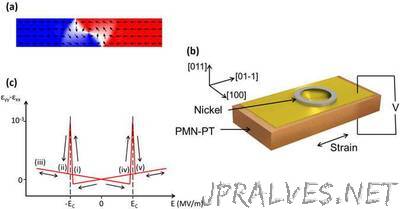
“Today almost all information stored on hard disc drives or cloud servers is recorded in magnetic media, because it is non-volatile (i.e. it retains the information when power is switched off) and cheap. For portable devices such as mobile phones and tablets, other forms of non-magnetic memory are used because the technology based on magnetism is impractical and is not energy efficient. In an age of mass data storage and portable devices which collect and process information, the search is on to find smaller, faster, cheaper and more energy efficient ways, of both processing and storing increasing amounts of data. In the course of their research into the use of magnetic domain walls (local regions of magnetic “charge” usually driven by magnetic fields) to increase our capacity for information storage and logical processing, physicists at the University of Nottingham have discovered a phenomenon which has allowed them to ‘manipulate’ the structure of a magnetic domain wall. The research carried out by researchers in the Spintronics Group in the School of Physics and Astronomy, in collaboration with York University, has been published in the open access journal Scientific Reports (Scientific Reports 7, Article number: 7613 (2017)”
